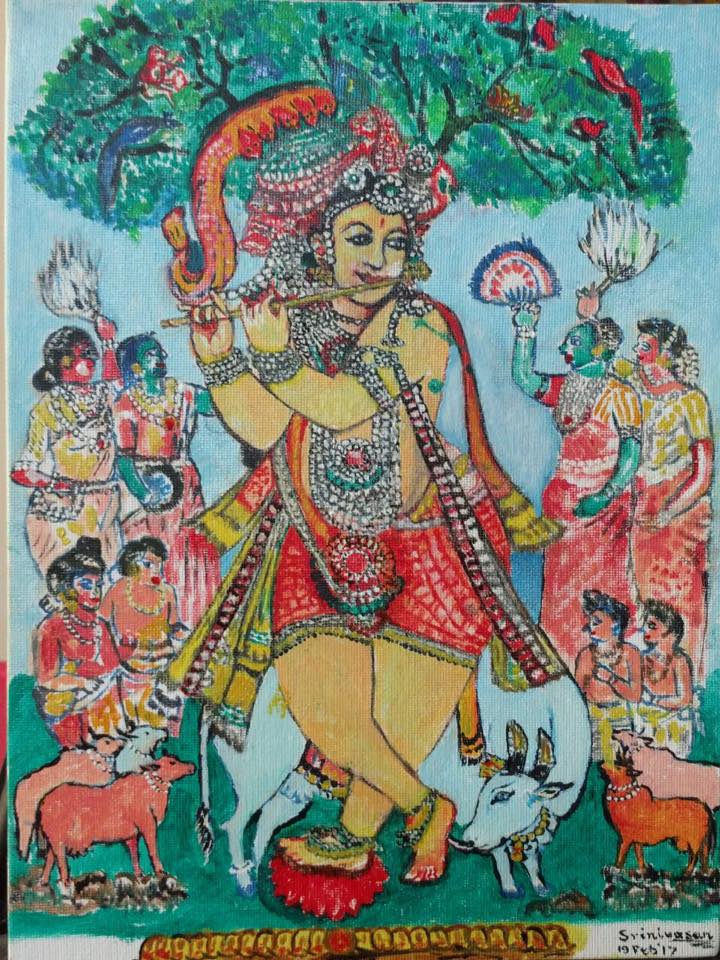பகவத் கீதை 01
Mahabharata – Bhishma Parva
(Gist of Bhagavad Gita)
Before the start of the war, Arjuna asked Sri Krishna, his Charioteer, to take the Chariot to the centre of the battlefield, so that he could see all those present there with whom he is going to fight. But he was terrified to see all his relatives, grandfathers, Gurus and friends who would fight with him and get killed by his arrows. He started trembling and his hands were shaking and his bow dropped out of his hands. In desperation, he sat down on his knees and refused to fight. Krishna saw his plight and asked him, “Why this sadness Arjuna that will cause you dishonour as if you are out of your gnana (senses), reached you at this inopportune moment.
Arjuna lamented, “I cannot kill my Grand fathers, Gurus and close relatives and I do not want to fight now, even if I am going to lose the kingdom. Instead of killing my near and dear ones, I will live seeking alms. I do not know what to do now. I am affected by Karpanya Dosha (a stage of helplessness), and I beseech your help”.

Krishna said, “You are grieving for something which cannot be grieved. You can only destroy bodies and not the soul, which is eternal. I have never been non existent neither are you. Atma is never destroyed. It changes bodies just like a snake changes its skin. Neither the fire burns an atma nor the ocean wets it. Even if you feel atma can be destroyed, those born would die one day. Why do you bother for something not in your control.
“Maya uses mind to spoil intellect and destroy gnana, making you fail to understand anything with true knowledge. It forces you to think about indestructible things as unstable, unstable things as permanent. That is why jivas think about their bodies as permanent and atma as nonexistent and they indulge in parents, wife, children, etc as permanent.
மாயையென்றொருத்தி தன்பான் மனமென்னும் மைந்தன் தோன்றித்
தூயனல்லறிவன் தன்னைத் தோற்றமின்றாக்கி வைத்தான்
தாயொடு தந்தை மக்கள் தாரமென்றி இவர்பால் வைத்த
நேயமும் அவன் தன்னாலே நிகழ்ந்ததோர் நினைவுகண்டாய்
(வில்லி பாரதம், வீட்டுமப்பருவம், 2)
“Vedas are told for all people with three gunas at different levels. You can take what is required for your salvation only from the Vedas as applicable to you. You have rights on your prescribed karma as per your kula dharma, and not on its fruits. One who is not bothered about failures nor about success is the one with stable mind. He reaches peace and salvation.
“Everyone, who even renounced everything should do the prescribed karmas. Otherwise, the cycle of life will not continue and will become standstill. So you do your duty without worrying about the fruit of your action. People will follow leaders like you. You cannot lead them to deception, by your inaction. Kama or desire is the reason for our bad actions, which are caused mainly by our Rajo guna.
“In every yuga, I take birth out of my maya, to destroy evil, protect the sadhus and to establish Dharma. I will teach the correct dharma to be followed by you. You can learn this Brahma gnana from gurus by prostrating before them.
“Doing karma without aspiring for its fruits is the best way to reach Moksha, and that is easier way than complete renunciation, which is difficult to practice. This karma yogi will have equal affinity to all jivas of earth, including animals, birds, humans, etc. One who does not renounce fruits of action, will never become a yogi.
“The mind is one’s friend as well as enemy. If you don’t control mind, it becomes your foe and destroy you completely through your desires. One who has controlled his mind should practice spending your thoughts on me by sitting on a stable seat and contemplationg on me always. He is equivalent to a lamp without any flickering without the wind disturbing it.
“Mind is controlled by Vairagya (resoluteness) and strict practice. Such a yogi never gets destroyed, even if he fails in his initial attempts. He takes birth in such a way that he can continue his yoga in his rebirths, till he attains moksha.”
Previous Gathering of forces
Next Gita 02

[…] Next Gita 01 […]
LikeLike
[…] VI Bhishma Parva1. Gita 01 […]
LikeLike
[…] Previous Gita 01 […]
LikeLike